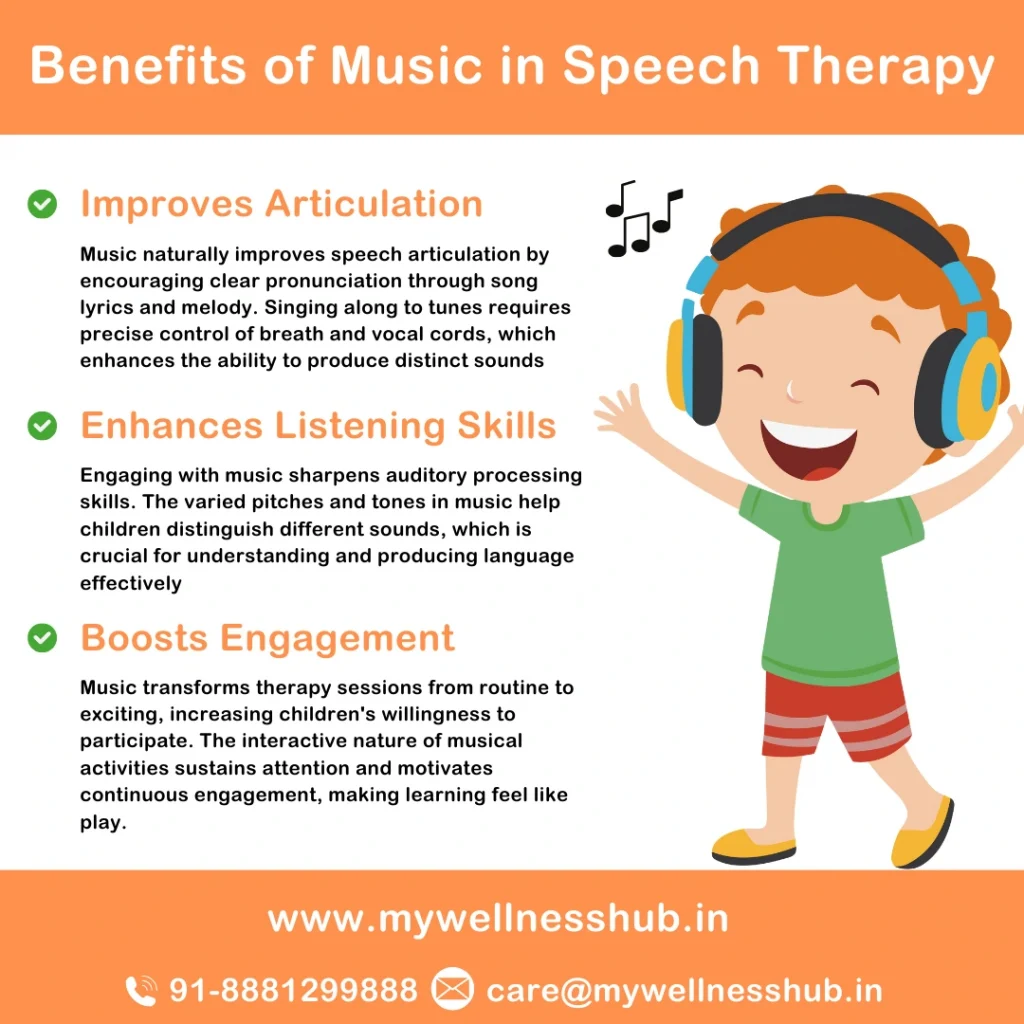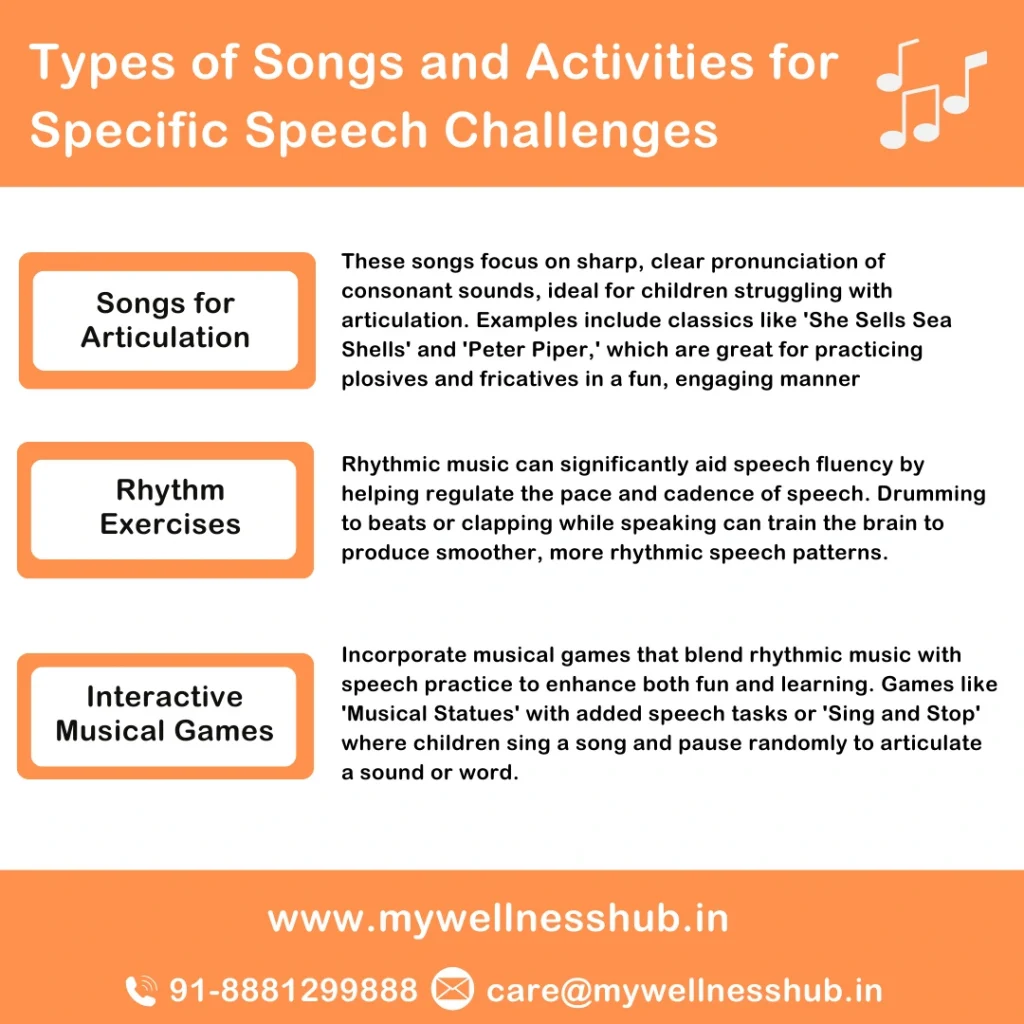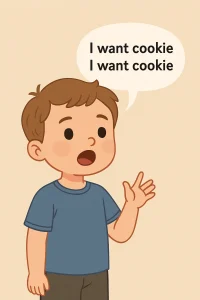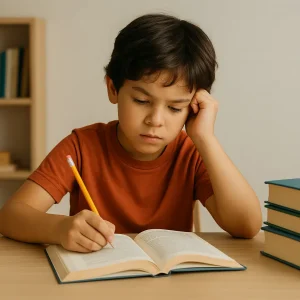Benefits of Using Music and Songs to Boost Speech Articulation
By Rajini D
Last Updated: December 19, 2024
Articulation—the ability to form clear speech sounds—is crucial for effective communication. Many individuals, especially children, struggle with this skill, impacting their ability to express themselves. Enter the world of music and songs, a therapeutic tool that speech therapists are increasingly using. The melodies and rhythms in music provide a fun and engaging way to enhance speech clarity. This approach not only improves articulation but also makes learning enjoyable. Let’s explore how music can be a game-changer in speech therapy, offering a melodious route to clearer communication.
Understanding Speech Articulation
What is Speech Articulation and Why Does It Matter?
Speech articulation is the process by which we form clear and precise sounds to communicate effectively. It involves the coordinated movement of the tongue, lips, palate, and vocal cords to produce recognizable speech. Good articulation is crucial because it influences how well we connect with others and how confidently we express our thoughts and needs.
Read More: 6 Simple Steps to Clear Speech for Better Connections
Navigating the Hurdles of Speech Development
Many individuals face hurdles in their speech development journey, particularly during early childhood. Some common challenges include:
- Delays in Speech Milestones: Children may not hit speech development milestones as expected, which can lead to frustrations in communication.
- Physical Impediments: Issues like tongue-tie or a cleft palate can physically hinder the ability to articulate clearly.
- Neurological Challenges: Conditions such as apraxia of speech make it difficult to plan and coordinate the muscle movements necessary for speaking.
- Auditory Processing Issues: Difficulty in processing sounds can also impair a child’s ability to reproduce those sounds accurately.
Also Read: Understanding Speech Delay: Causes, Milestones, and Therapy
Why Use Music and Songs for Speech Therapy?

1. The Power of Music in Therapy
Music touches more than just our ears; it reaches our emotions too, making us open and ready to learn. This emotional boost is crucial in speech therapy, as feeling good can make therapy more effective. Music doesn’t just make us feel better; it also wakes up parts of the brain that help us speak. These areas are involved in how we understand and make speech sounds, making music a strong ally in speech therapy.
2. Enhancing Phonetic Awareness
Songs can be a fun way to learn how to hear and make different sounds. Simple, catchy tunes make it easier for learners to pick up speech sounds, turning practice into a playful experience. Using phonetic exercises with music makes these lessons stick better, helping learners get better at making sounds more quickly.
3. Rhythm and Timing in Speech Development
Rhythm helps with more than just music; it improves how we time our words when we speak. Following the beat in songs can teach better speech pacing, helping people speak more smoothly and clearly. This rhythmic speech stimulation is key for those who struggle with speaking fluently.
Practical Benefits of Music and Songs in Speech Therapy
Real-Life Improvements Seen in Therapy
Many speech therapists have noticed that using music and songs during sessions helps clients speak more clearly. Music makes therapy fun and engaging, helping clients learn new speech skills more effectively. It can reinforce language patterns and sounds, aiding memory and practice.
Articulation Exercises with Music
Using Music to Make Speech Exercises Fun
Adding music to articulation exercises can turn a routine practice into an enjoyable activity. For instance, setting tongue twisters to familiar tunes can help practice specific speech sounds in a fun way. This method helps improve pronunciation and speech rhythm.
Example Exercise:
- Melodic Tongue Twisters: Use simple tongue twisters set to the tunes of well-known songs. This helps in practicing tricky sounds and makes the exercise more engaging.
Songs for Speech Clarity

Songs That Help With Pronunciation
Using songs in therapy can be particularly effective for teaching clear pronunciation. Songs with straightforward, slow lyrics make it easier for clients to understand and mimic sounds. Singing these songs can enhance speech clarity as it requires careful control of breathing and vocal cords.
Song Examples for Therapy:
- “The Raindrop Song”: This song helps practice sounds like /p/, /t/, and /k/.
- “Animal Sounds on the Farm”: Encourages making various animal noises, which is a fun way for clients to practice different sounds and vocal pitches.
Songs for Articulation Improvement
| Song Title | Sounds Focused | Activity Suggestions |
| She Sells Sea Shells | “Sh” sounds | Activity: Gather in a circle and sing the chorus of “She Sells Sea Shells” together. After singing, discuss which “sh” sounds were most challenging and repeat those parts slowly, focusing on clarity and precision. This repetition helps reinforce the correct articulation of “sh” sounds in a fun and musical way. |
| Peter Piper | “P” sounds | Activity: Sing the “Peter Piper” tongue twister as a group, then individually. Focus on articulating each “p” sound clearly in rhythm with the music. This activity not only makes practicing fun but also emphasizes rhythmic pronunciation, which can help in developing motor planning for speech. |
| Betty Botter | “B” and “T” sounds | Activity: Begin by singing “Betty Botter” together. After singing, take turns saying the tongue twister aloud, emphasizing the “b” and “t” sounds. Alternate between singing and speaking the tongue twister to engage different aspects of speech processing and to enhance articulation through varied auditory input. |
How to Incorporate Music into Speech Therapy Sessions
A Simple Guide for Therapists and Parents
Using music in speech therapy can make sessions more enjoyable and effective. Here’s a straightforward guide on how to integrate music into your therapy practices:
Choose Appropriate Music
- Pick Relevant Songs: Select songs with clear lyrics that focus on the sounds or skills you want to improve.
- Consider Preferences: Choose music that the client enjoys to increase their engagement.
Define Goals
- Identify Target Sounds: Decide which articulation skills or sounds to focus on.
- Plan Activities: Design activities that use the selected songs to reinforce these skills.
Engage with Music
- Sing Along: Encourage the client to sing along, which helps with sound clarity and rhythm.
- Fill in the Blanks: Pause the music and let the client fill in missing words, enhancing their active listening and speech production.
Practice Regularly
- Repeat Often: Use the same songs across multiple sessions to reinforce learning.
- Consistency is Key: Regular practice helps improve speech skills effectively.
Adjust as Needed
- Track Progress: Monitor how well the client is doing and make adjustments to the music or activities based on their progress.
- Seek Feedback: Ask the client what they enjoy most and use that feedback to shape future sessions.
Conclusion
Integrating music into speech therapy can dramatically improve articulation and make learning fun. Music taps into rhythmic patterns that help with language development and keeps sessions engaging. Whether you’re a professional or a parent, using music can open new pathways for speech improvement. Discover more creative strategies and tools at Wellness Hub. Our resources are designed to make each therapy session enjoyable and effective. Visit us today to see how music can enhance your therapy techniques and help those you care for find their voice.
Frequently Asked Questions:
1. What are the benefits of using music in speech therapy?
Music engages children on multiple levels, aiding in motor control, auditory processing, and emotional expression. It can help improve articulation, enhance listening skills, and foster a joyful learning environment. Music’s repetitive and rhythmic nature also helps reinforce language patterns, making it easier for children to learn and remember new words and sounds.
2. How can music help a child with speech delay?
Music stimulates various parts of the brain involved in speech production and auditory processing. For children with speech delays, singing songs and engaging in musical activities can enhance mouth and throat muscle coordination, improve their rhythm and timing in speech, and boost their vocabulary through repetitive lyric
3. Which songs are best for speech therapy?
Ideal songs for speech therapy have repetitive lyrics, clear pronunciation, and simple melodies. Songs like “Old MacDonald Had a Farm” or “The Wheels on the Bus” provide opportunities to practice sounds and syllables in a fun context. Choose songs that target specific phonetic sounds or language skills your child needs to develop.
4. Can music therapy help all children with speech issues?
Music therapy can be highly beneficial for most children with speech difficulties, though its effectiveness might vary depending on the child’s specific challenges and preferences. It is particularly effective for children who are responsive to auditory and rhythmic cues but should be tailored to fit individual needs and integrated with other therapeutic approaches for the best results.
5. How often should music be used in speech therapy sessions?
Integrating music regularly into speech therapy sessions can maximize its benefits. For most children, including music activities in daily routines or at least several times a week during structured therapy sessions can help reinforce learning and improve speech abilities consistently over time.
6. What activities can I do at home to support music-based speech therapy?
At home, you can support music-based speech therapy by engaging in activities like sing-alongs to children’s songs, playing rhythmic clapping games, and using musical instruments like tambourines or keyboards to explore different sounds. These activities help children practice speech patterns and sounds in a relaxed and familiar setting.
7. Is musical speech therapy effective for toddlers?
Yes, toddlers are particularly receptive to music, and incorporating musical elements into speech therapy can accelerate their speech and language development. Early musical interventions can enhance toddlers’ ability to understand speech patterns, develop vocabulary, and improve their ability to articulate words clearly
8. How long does it take to see improvements with music therapy?
The time it takes to see improvements with music therapy can vary widely depending on the child’s initial speech capabilities and how consistently the therapy is applied. However, many parents and therapists report noticeable progress in speech clarity, fluency, and language skills within a few months of regular musical engagement.
9. Where can I find resources for music-based speech therapy?
Wellness Hub offers a variety of resources tailored to using music in speech therapy, including guides, song recommendations, and specific exercises designed to improve speech and language skills. These resources are developed by experts and are an excellent starting point for parents and therapists alike.
10. Can I use any music genre for speech therapy?
While most music genres can be useful, it’s best to select genres that are age-appropriate and engaging for the child, with clear lyrics and rhythms that support the goals of therapy. Children often respond well to genres they enjoy, which can vary from classical music to children’s songs, depending on the child’s interests and the therapeutic objectives.
About the Author:
Rajini Darugupally
M.Sc., Speech-Language Pathologist (9+ years of experience)
Rajini is a passionate and dedicated Speech-Language Pathologist with over 9+ years of experience, specializing in both developmental speech and language disorders in children and rehabilitation in adults. Currently, at Wellness Hub, she thrives in a team environment that values innovation, compassion, and achieving results for their clients.
Book your Free Consultation Today
Parent/Caregiver Info:
Client’s Details:
* Error Message








